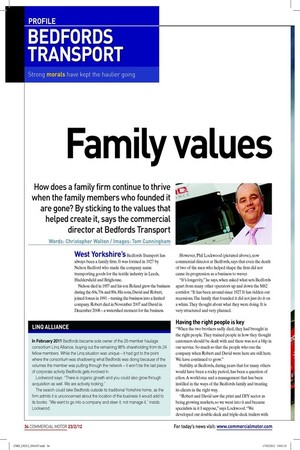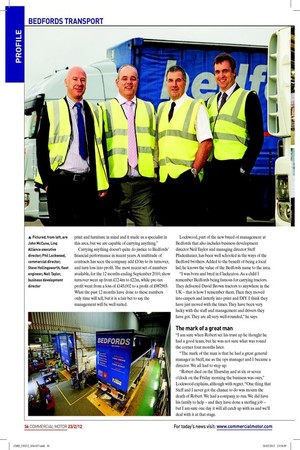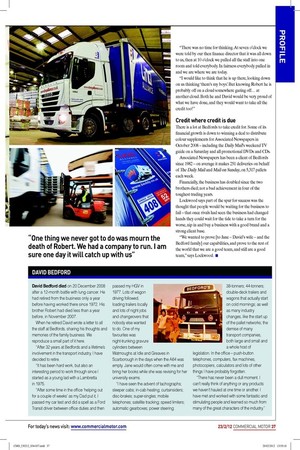Family values
Page 27

Page 29

Page 30

If you've noticed an error in this article please click here to report it so we can fix it.
BEDFORDS TRANSPORT
Strong morals have kept the haulier going
How does a family firm continue to thrive when the family members who founded it are gone? By sticking to the values that helped create it, says the commercial director at Bedfords Transport
Words: Christopher Walton / Images: Tom Cunningham West Yorkshire’s Bedfords Transport has
always been a family irm. It was formed in 1927 by Nelson Bedford who made the company name transporting goods for the textile industry in Leeds, Huddersield and Brighouse.
Nelson died in 1957 and his son Roland grew the business during the 60s, 70s and 80s. His sons, David and Robert, joined forces in 1991 – turning the business into a limited company. Robert died in November 2007 and David in December 2008 – a watershed moment for the business. However, Phil Lockwood (pictured above), now commercial director at Bedfords, says that even the death of two of the men who helped shape the irm did not cause its progression as a business to waver.
“It’s longevity,” he says, when asked what sets Bedfords apart from many other operators up and down the M62 corridor. “It has been around since 1927. It has ridden out recessions. The family that founded it did not just do it on a whim. They thought about what they were doing. It is very structured and very planned.
Having the right people is key
“When the two brothers sadly died, they had brought in the right people. They trained people in how they thought customers should be dealt with and there was not a blip in our service. So much so that the people who ran the company when Robert and David were here are still here. We have continued to grow.” Stability at Bedfords, during years that for many others would have been a rocky period, has been a question of ethos. A workforce and a management that has been instilled in the ways of the Bedfords family and treating its clients in the right way.
“Robert and David saw the print and DIY sector as being growing markets, so we went into it and became specialists in it I suppose,” says Lockwood. “We developed our double-deck and triple-deck trailers with print and furniture in mind and it made us a specialist in this area, but we are capable of carrying anything.” Carrying anything doesn’t quite do justice to Bedfords’ inancial performance in recent years. A multitude of contracts has seen the company add £10m to its turnover, and turn loss into proit. The most recent set of numbers available, for the 12 months ending September 2010, show turnover went up from £12.4m to £22m, while pre-tax proit went from a loss of £145,002 to a proit of £987,965. What the past 12 months have done to these numbers only time will tell, but it is a fair bet to say the management will be well suited. Lockwood, part of the new breed of management at Bedfords that also includes business development director Neil Taylor and managing director Steff Pfadenhauer, has been well schooled in the ways of the Bedford brothers. Added to the beneit of being a local lad, he knows the value of the Bedfords name to the area.
“I was born and bred in Clackeaton. As a child I remember Bedfords being famous for carrying tractors. They delivered David Brown tractors to anywhere in the UK – that is how I remember them. Then they moved into carpets and latterly into print and DIY. I think they have just moved with the times. They have been very lucky with the staff and management and drivers they have got. They are all very well-rounded,” he says.
The mark of a great man
“I am sure when Robert set his trust up he thought he had a good team, but he was not sure what was round the corner four months later.
“The mark of the man is that he had a great general manager in Steff, me as the ops manager and I became a director. We all had to step up.
“Robert died on the Thursday and at six or seven o’clock on the Friday morning the business was ours,” Lockwood explains, although with regret. “One thing that Steff and I never got the chance to do was mourn the death of Robert. We had a company to run. We did have his family to help – and they have done a sterling job – but I am sure one day it will all catch up with us and we’ll deal with it at that stage. “There was no time for thinking. At seven o’clock we were told by our then inance director that it was all down to us, then at 10 o’clock we pulled all the staff into one room and told everybody. In fairness everybody pulled in and we are where we are today.
“I would like to think that he is up there, looking down on us thinking ‘them’s my boys’. But knowing Robert he is probably off on a cloud somewhere gazing off... at another cloud. Both he and David would be very proud of what we have done, and they would want to take all the credit too!”
Credit where credit is due
There is a lot at Bedfords to take credit for. Some of its inancial growth is down to winning a deal to distribute colour supplements for Associated Newspapers in October 2008 – including the Daily Mail’s weekend TV guide on a Saturday and all promotional DVDs and CDs.
Associated Newspapers has been a client of Bedfords since 1982 – on average it makes 251 deliveries on behalf of The Daily Mail and Mail on Sunday, on 5,317 pallets each week.
Financially, the business has doubled since the two brothers died; not a bad achievement in four of the toughest trading years.
Lockwood says part of the spur for success was the thought that people would be waiting for the business to fail – that once rivals had seen the business had changed hands they could wait for the tide to take a turn for the worse, nip in and buy a business with a good brand and a strong client base.
“We wanted to prove [to Jane – David’s wife – and the Bedford family] our capabilities, and prove to the rest of the world that we are a good team, and still are a good team,” says Lockwood. ■
LINQ ALLIANCE
In February 2011 Bedfords became sole owner of the 25-member haulage consortium Linq Alliance, buying out the remaining 96% shareholding from its 24 fellow members. While the Linq situation was unique – it had got to the point where the consortium was shadowing what Bedfords was doing because of the volumes the member was putting through the network – it won’t be the last piece of corporate activity Bedfords gets involved in.
Lockwood says: “There is organic growth and you could also grow through acquisition as well. We are actively looking.” The search could take Bedfords outside its traditional Yorkshire home, as the firm admits it is unconcerned about the location of the business it would add to its books. “We want to go into a company and steer it, not manage it,” insists Lockwood.
DAVID BEDFORD
David Bedford died on 20 December 2008 after a 12-month battle with lung cancer. He had retired from the business only a year before having worked there since 1972. His brother Robert had died less than a year before, in November 2007.
When he retired David wrote a letter to all the staff at Bedfords, sharing his thoughts and memories of the family business. We reproduce a small part of it here.
“After 32 years at Bedfords and a lifetime’s involvement in the transport industry, I have decided to retire.
“It has been hard work, but also an interesting period to work through since I started as a young lad with a Lambretta in 1975.
“After some time in the office ‘helping out for a couple of weeks’ as my Dad put it, I passed my car test and did a spell as a Ford Transit driver between office duties and then passed my HGV in 1977. Lots of wagon driving followed, loading trailers locally and lots of night jobs and changeovers that nobody else wanted to do. One of my favourites was night-trunking gravure cylinders between Watmoughs at Idle and Greaves in Scarborough in the days when the A64 was empty. Jane would often come with me and bring her books while she was revising for her university exams.
“I have seen the advent of tachographs; sleeper cabs; in-cab heating; curtainsiders; disc-brakes; super-singles; mobile telephones; satellite tracking; speed limiters; automatic gearboxes; power steering; 38-tonners; 44-tonners; double-deck trailers and wagons that actually start on cold mornings; as well as many industry changes, like the start up of the pallet networks; the demise of many transport companies, both large and small and a whole host of legislation. In the office – push-button telephones, computers, fax machines, photocopiers, calculators and lots of other things I have probably forgotten.
“There has never been a dull moment. I can’t really think of anything or any products we haven’t hauled at one time or another. I have met and worked with some fantastic and stimulating people and learned so much from many of the great characters of the industry.”












































